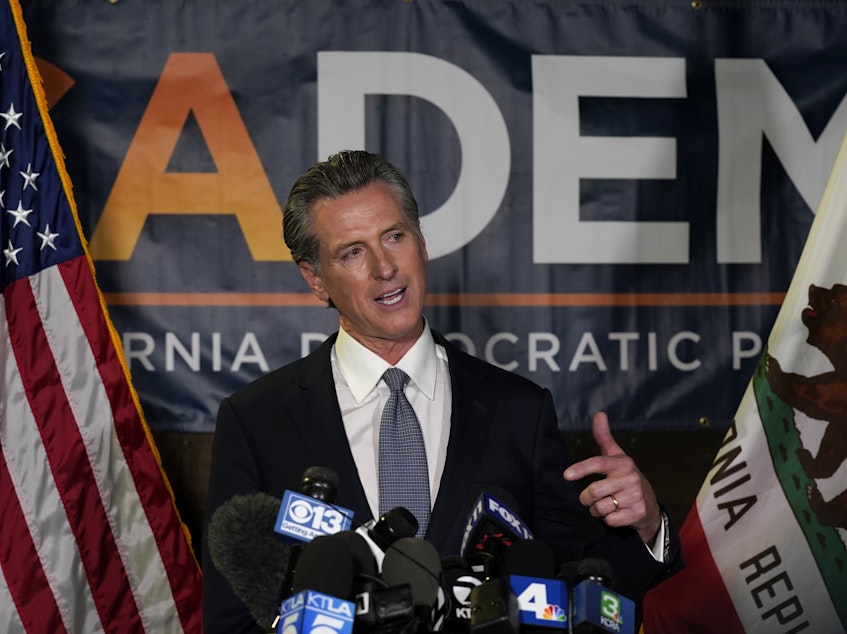Efforts To Recall Governors Are Common, But They Rarely Succeed

California's Gavin Newsom can now count himself among a select group of survivors — he's just one of two governors ever to face a recall vote and win.
Then again, most recall campaigns flounder before the voters go to the polls.
The unsuccessful vote against Newsom, who angered many in the state by dining at an upscale Napa Valley restaurant in contravention of his own guidance on pandemic gatherings, follows the 2012 effort to recall then-Wisconsin Gov. Scott Walker, who narrowly turned back an effort by the state's Democrats to oust him.
Nineteen states allow recall elections, but even in them, the odds of success are slim. Only two gubernatorial recall votes have ever been successful — one aimed at Calif. Gov. Gray Davis, a Democrat, in 2003 after voters blamed him for a state electricity crisis and a faltering economy. Another turned out North Dakota's Gov. Lynn Frazier in 1921. In 1988, Arizona Republican Gov. Evan Mecham would have faced a recall vote had he not first been removed after being impeached and convicted by the legislature.
The failure of most of these efforts isn't for lack of trying. In California alone, there have been 55 attempts since 1913 to recall governors (six of the campaigns were against Newsom), giving individual recall efforts a less than 2% chance of success. Most efforts fail to get the required number of petition signatures and therefore never make it to a ballot.
Successful recalls are rare, says Enrijeta Shino, a political science professor at the University of North Florida. "However, the last two have happened in the last decade," she says, pointing to the "highly polarized political landscape."
"We might see more recall elections in the future than we've seen to date," she tells NPR.
Even so, "[There] have been tons of attempts to recall Governors," writes Joshua Spivak, the author of Recall Elections: From Alexander Hamilton To Gavin Newsom. "Last year 15 Governors faced recall attempts."
With about 64% of voters casting ballots voting "no" on recall, the outcome in the case of Newsom was never in much doubt. For Republicans pushing the governor's ouster, Spivak borrows a line from Bob Dylan: "When you've got nothing, you've got nothing to lose."
Even the successful recall of Davis 18 years ago was a Pyrrhic victory, Spivak told NPR's Morning Edition earlier this week. Getting rid of Davis brought in Republican Gov. Arnold Schwarzenegger, but the GOP has continued to lose ground in the state. "But was that something that provided a long-term benefit for the Republicans? I can't see in any way, shape or form that it did," Spivak said.
Likewise, the unsuccessful bid nine years ago to remove Walker. "I don't think Democrats gained anything in Wisconsin," Barry Burden, a political science professor at the University of Wisconsin-Madison, tells NPR. When they failed to unseat Walker, "I think it set back the Democrats for awhile and emboldened Scott Walker and his supporters."
"Walker ended up having a very successful two-term governorship, even running for president. He sort of became a darling of conservatives around the country as a result, and that helped fuel his presidential campaign," Burden says.
Shino, however, cautions not to make broad comparisons between the recall votes for Walker and Newsom. The ultimate outcome was the same, but the circumstances were different, she notes.
"Wisconsin is a swing state and Walker was pushing hard against a white working-class union-vested status quo in shaking up state policy," she says. Despite the his missteps that angered voters, "Newsom is aligned with the vast majority of California voters," she says.
Burden thinks there's another reason why recall efforts are so rarely successful. He says in states, such as California, where a lot of propositions and initiatives get on the ballot, they tend to get there with the backing of organized interests — business lobbyists, advocacy groups, trade organizations."
Those efforts "have an infrastructure of lawyers and paid employees and experience doing it," he says. "But the groups that push for recalls don't have any of that. And often they sort of start as a kind of excitable idea. And then within weeks, they fizzle." [Copyright 2021 NPR]



